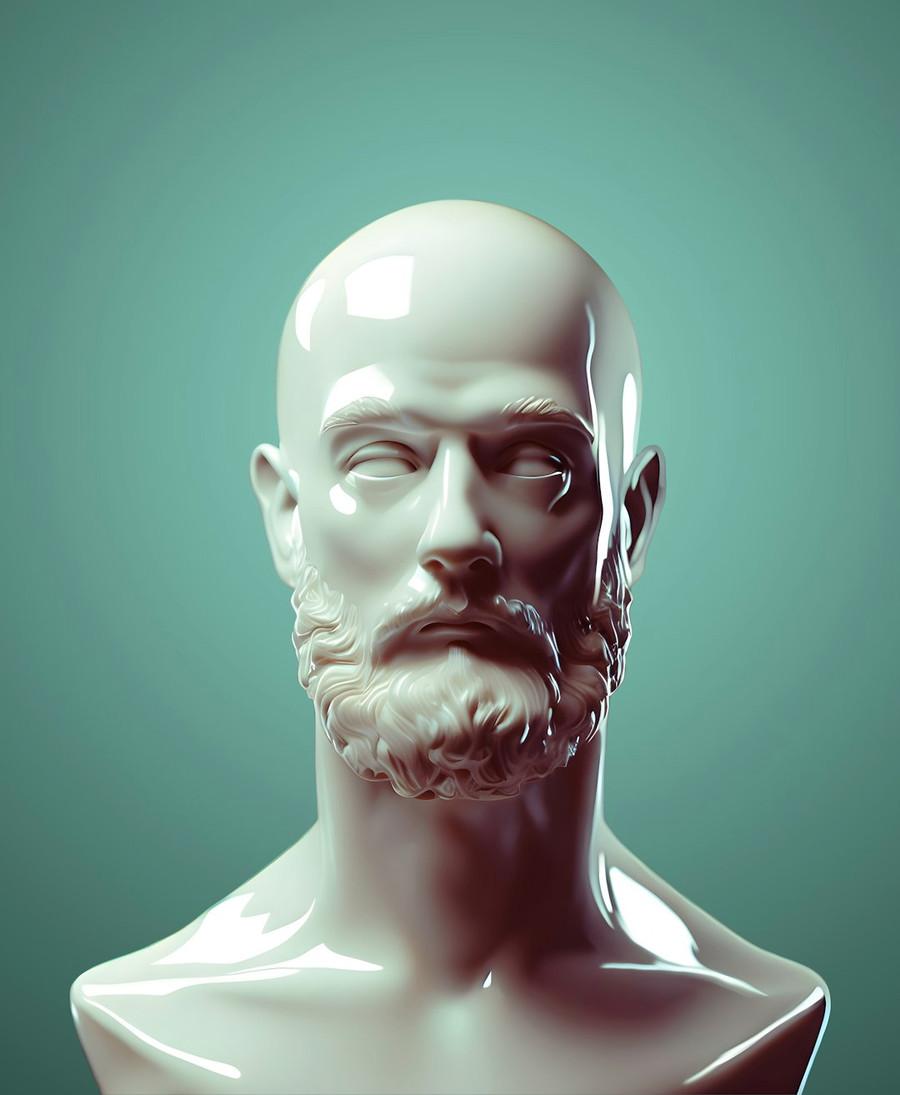K 's Key Ideas from How to Be a Stoic
by Massimo Pigliucci
Ideas, facts & insights covering these topics:
52 ideas
·81.5K reads
240
1
Explore the World's Best Ideas
Join today and uncover 100+ curated journeys from 50+ topics. Unlock access to our mobile app with extensive features.
How to Be a Stoic Using Ancient Philosophy
How to Be a Stoic teaches you how to apply the ancient philosophies of Socrates, Epictetus, and Marcus Aurelius to modern life. So, how can you embrace this powerful mindset? It’s simple! Follow these three key steps:
— Develop emotional resilience
— Cultivate courage
— Strengthen your character
776
7.85K reads
About Massimo Pigliucci
Massimo Pigliucci is an Italian-American philosopher, evolutionary biologist, and writer. He is a professor of philosophy at the City College of New York. Pigliucci researches the connection between science and philosophy, focusing on evolution and genetics. He is the author of several books and articles about these topics and a frequent speaker on science and philosophy.
694
5.13K reads
1. Develop Moral Character with Stoicism
Have you ever wondered how to live a fulfilling life when faced with life’s inevitable difficulties? You’re not alone! Throughout human history, religions & philosophies have tackled this big existential question. Even science has gotten into the business of addressing these issues.
Most people think that this philosophy makes Stoics avoid being involved in society and public activities. But Stoicism encourages love for all humankind & nature.
Death and personal extinction were important to the original Stoics. They believed that life is an ongoing project and that death is nothing special.
716
4.93K reads
"Stoicism is a Philosophy for Everyone"
Stoicism is a philosophy, not a type of therapy, and everyone needs a philosophy of life. But it has played a huge role in modern psychological therapies. Stoicism has inspired Viktor Frankl’s logotherapy and Albert Ellis’s rational emotive behavior therapy (REBT).
What makes Stoicism unique? It focuses on building moral character, rather than chasing wealth or education. There are connections between Stoicism and other worldviews, religions, and even secular humanism.
714
4.08K reads
It offers an attractive alternative for those seeking a religious outlook beyond fundamentalism. At its core, Stoicism seeks to answer one essential question: how should we live our lives?
The ancient Stoics might have been a bit too optimistic about our ability to control our thoughts. Cognitive science has shown that we’re often susceptible to biases and delusions. But don’t let that discourage you! Stoicism still offers valuable lessons and tools for personal growth.
706
3.39K reads
A Road Map for the Journey
Stoicism didn’t come out of nowhere. Previous philosophical schools and thinkers influenced Stoicism’s development. Stoicism is a practical philosophy based on the idea that to live a good life, you have to understand the nature of the world and human reasoning. A student of Stoicism in ancient times would have explored subjects like physics, logic, and ethics. They believed that developing moral character required this kind of knowledge. It was this holistic approach to learning that made their philosophy so powerful and enduring.
705
2.87K reads
2. Tap Into Your Inner Strengths with Stoic Philosophy
Epictetus believed that some things are within our control, such as our opinions, impulses, desires, and aversions, while our bodies, possessions, and reputations are not. We can take care of them to the best of our ability, but external factors can still impact them. It is important to focus on what is within our control and not become too attached to external outcomes.
720
2.74K reads
Epictetus’s example shows that the Stoic dichotomy of control comprises three levels of influence over the world:
we make choiceswe can influence some thingswe cannot influence others
Epictetus says we should focus on what we can control and let the universe take its course. This will save us energy and worry.
713
2.52K reads
“One of the first lessons from Stoicism, then, is to focus our attention and efforts where we have the most power and then let the universe run as it will. This will save us both a lot of energy and a lot of worry.” —
MASSIMO PIGLIUCCI
749
2.51K reads
Here is an excellent Stoic metaphor: An archer can only control the arrow until they release it from the bow. After that, hitting the target is out of their hands. The Stoic archer accepts that other variables might cause them to miss their target. They also accept that they have done the best they can to achieve the goal.
The Stoic dichotomy of control applies throughout our lives. A Stoic mindset allows you to sleep peacefully and wake up confident to deal with whatever comes your way.
760
2.25K reads
3: Stoicism Explains Human Nature’s Unique Characteristics
The Stoics were famous in antiquity for inventing new words to explain their philosophy. One memorable catchphrase that captures the essence of Stoicism is the call to live our lives “according to nature.”
The ancients knew human beings are special in the animal world. We can think, and we live in communities of other human beings. Human life is about using reason to build the best society that it is humanly possible to build.
692
2.04K reads
The very idea of human nature is now somewhat in trouble. Both scientists and philosophers are increasingly uncomfortable with the notion. Some of them even reject the notion. But Pigliucci thinks, “They are seriously mistaken in doing so.” Until the mid-1800s, people in the West thought an all-powerful God had specially created humans. They accepted Aristotle’s argument that humans are special because they are built in the image of God.
691
1.91K reads
Let’s imagine the secret recipe for evolution: variation, differential fitness, and inheritance. When you mix these ingredients together, an intriguing outcome emerges. Fit people are more likely to survive and have more kids. Humans are different from wild beasts and sheep, but not so different from other primates. Not only do we live in cooperative social groups, but we also display moral behavior.
689
1.73K reads
Darwinism and Essentialism: Examining Human Nature
Some philosophers argue Darwin dealt a death blow to the idea of Essentialism. Others argue that human nature is so flexible that we can’t talk about a unified concept of it.
The latter argument is strange on two counts:
1. If human culture were that variable, then that would help distinguish humans from other species.
2. All human beings share quite a few traits that are not variable across cultures.
As a species, humans stand out from other life forms on earth due to our unique social and mental abilities.
687
1.6K reads
4. Stoicism = Intuitionism + Empiricism Rationalism
In modern discussions of the roots of morality, there are four ways to look at the issue:
- Skeptics think that there is no way to know which ethical judgments are right or not.
- Rationalism is a general position in philosophy that maintains that we can arrive at knowledge by simply thinking about stuff.
- Empiricism is the stance that we arrive at knowledge based on empirical facts.
- Intuitionism suggests that ethical knowledge doesn’t rely on reasoning or observation. It’s innate within us as strong intuitions about right and wrong.
705
1.48K reads
Philosophers classify these positions as “meta-ethical”. Stoicism is interesting because it doesn’t fit neatly into these four categories. Instead, it is a combination of intuitionism, empiricism, and rationalism.
Let’s imagine a world where moral virtue is king, and comfort and wealth are secondary. This is what the Stoics believed in. Our thoughts and actions become clearer as we grow and develop between the ages of six and eight. A combination of self-reflection and experience refines our instincts. It contributes to our understanding and decision-making abilities.
698
1.35K reads
The Moral Dilemma of Socrates
A morally good man, Socrates fulfilled his military duties and taught philosophy. When sentenced to death, Socrates made it clear that he had a moral duty to obey the laws, even if they seemed misused. He believed we shouldn’t twist the rules to suit our own needs.
So, what can we learn from Socrates? While we may not face the same ethical dilemmas as Socrates, we still confront countless decisions and challenges. We have to strive to uphold our own moral obligations, no matter the situation.
695
1.22K reads
5: Discover the Paradox of Virtues b/n Aristotle and the Stoics
Aristotle proposed a practical, though elitist, version of virtue ethics. This involved striving for virtue but also necessitated health, wealth, education, and good looks. Aristotle and the Cynics thought eudaimonia could only be achieved by certain people.
The Stoics viewed health, wealth, and education as “preferred indifferents” while their opposites are “dispreferred indifferents”. The virtue involved in each case is the same, whether it comes through joy or through sorrow. Avoid pain and experience joy, but not at the expense of your integrity.
689
1.18K reads
"Better to endure pain in an honorable manner than to seek joy in a shameful one.”
MASSIMO PIGLIUCCI
725
1.79K reads
Stoic virtue is based on wisdom, courage, temperance, and justice. In Stoicism, there are distinctions between goods – like virtue and health – to which standard economic theory doesn’t apply.
We all already use lexicographic indexing for many of our choices. Aristotle says you have to be part of the lucky elite to enjoy a nice vacation.
690
1.1K reads
6. God or Atoms? Explore Stoicism’s View
Stoicism allows both believers and non-believers to agree on ethical principles. Epictetus and Thomas believers often rely on causality arguments. Aquinas used the argument from design to defend the existence of God. It was a few decades before Darwin wrote On the Origin of Species.
Hume crafted a powerful argument against the appeal to design. But the world’s appearance of design, especially in biology, remained a mystery to him. That’s where Darwin’s theory of evolution by natural selection comes in.
688
1.04K reads
Now, scientists accept Darwin’s theory as the reason why eyes, hands, hearts, and lungs resemble designed objects. These body parts are products of natural phenomena & don’t need intelligent design.
Many Stoics didn’t believe in anything like the modern monotheistic conception of God. Stoics believed we’re all part of God and that using reason to solve problems is the way to live.
The idea of identifying God with nature has a long history. The famous 17th-century Dutch philosopher, Baruch Spinoza, particularly developed this concept. You might have even heard it referred to as “Einstein’s God.”
689
997 reads
There are two important aspects to consider in this view of God:
1. This divine being doesn’t perform miracles or suspend the laws of nature to fix local issues.
2. This perspective aligns with the Stoic idea that the universe operates through a web of cause and effect. It’s a concept that’s compatible with our modern scientific understanding.
689
963 reads
There are some who say that the gods do not exist. Others believe God exists, but he’s inactive and indifferent. Still, others say that the gods exist but are only concerned with great things and heavenly affairs, not with earthly concerns. Lastly, there is a group, which includes figures like Odysseus and Socrates, who believe that God sees and is present in everything they do.
688
904 reads
Living in Alignment with the Natural World
Stoicism doesn’t claim that the ultimate goal of humans is to follow the gods. That’s just one interpretation. Instead, Stoics advocate for living in harmony with nature. We also have to equate this by clarifying nature’s relationship with the gods in order to follow the gods.
692
921 reads
There was disagreement on this topic among Stoics and between them and Epicureans. Epicureans were more like modern-day deists. They believed in the existence of God, but viewed God as primarily focused on divine matters. According to the Epicureans, the world is made up of atoms bumping into each other. While humans can use reason, their actions and decisions are subject to physical forces, not divine providence.
Some Stoics acknowledged this possibility. But others assert that philosophy isn’t religion and has no sacred texts or unquestionable doctrines.
685
869 reads
7. It’s All About Character (and Virtue)
A study explored how virtues are expressed across different belief systems. The researchers found strong similarities between different religious and philosophical traditions. They identified a set of six “core” virtues:
1. Courage: It involves the exercise of will to achieve goals despite facing opposition. Examples include bravery, perseverance, and authenticity.
2. Justice: It underpins a healthy community life. Examples include fairness, leadership, and citizenship or teamwork.
699
935 reads
3. Humanity: It involves nurturing and supporting others, often described as “tending and befriending.” Examples include love and kindness.
4. Temperance: It helps protect against excess and maintain balance in our lives. Examples include forgiveness, humility, prudence, and self-control.
5. Wisdom: It involves acquiring and using knowledge in meaningful ways. Examples include creativity, curiosity, judgment, and perspective (offering counsel to others).
701
879 reads
6. Transcendence: It enables us to forge connections with the larger universe, providing us with a sense of meaning and purpose. Examples include gratitude, hope, and spirituality.
Four of the six core virtues are consistent with the Stoic ones. Stoics also saw humanity and transcendence not as virtues, but as attitudes.
Stoics believed that wisdom is the “chief good” because it is the only human ability that is good under every and all circumstances. We can enhance our eudaimonia (the good life) by making wise decisions based on courage, temperance, and justice.
703
820 reads
8. Overcome Adversity Through Stoic Philosophy
Have you ever felt overwhelmed by life’s challenges, like living with a disability or battling a mental illness? Stoicism offers invaluable tools to help you navigate these tough situations. We need to practice the Socratic task of knowing ourselves. It includes knowing our limits and recognizing when we have lost a good fit between our abilities and our activities.
To develop a life plan, we need to look at our entire life, and arrive at decisions “all things considered.” The plan should be coherent, ambitious, achievable, and revivable.
696
781 reads
How can you find harmony within yourself? Align your spiritual and rational experiences, desires, reasons, and needs with your actions.
Another technique used in Stoicism is visualization. Visualizing negative happenings decreases our fear of them. The crisis mentally prepares us, but it also makes us grateful for good things. Stoicism empowers you to cope with challenges like living in a wheelchair, battling depression, or dealing with autism.
694
764 reads
9. Discover the Stoic Perspective on Death and Suicide
Stoics took destiny more seriously than many of us do today. Epictetus draws a comparison between humans and wheat. As wheat grows to ripen in the sun and be reaped, humans, too, are destined for a similar fate.
Epictetus emphasized that our distress about death comes from our unique ability to contemplate it. But, understanding something doesn’t change its nature; it only alters our attitude towards it. He suggested that our fear of death stems from ignorance.
692
733 reads
If we knew more about the human condition, we wouldn’t be so fearful of our own mortality. Other Stoics echoed this idea, like Seneca, and later figures influenced by Stoicism, such as Montaigne. Even the Stoics’ rivals, the Epicureans, agreed. As their founder wrote in his “Letter to Menoeceus,” when we are alive, death is not present, and when death arrives, we are no longer present.
Some people, however, remain unconvinced by the idea of accepting death as a natural part of life. A group of techno-optimists, known as “Transhumanists,” believe that death is a disease that can be cured.
690
723 reads
One of the most prominent figures in this movement is Ray Kurzweil. He is a futurist working on natural language understanding software. He proposes that the key to immortality lies in uploading our consciousness into a computer, which he believes will soon be possible.
Kurzweil doesn’t want to leave the party, no matter what the cost, and regardless of how privileged they have been while attending it. Stoicism advised him to leave, in a thankful and modest spirit, and make room for others.
686
693 reads
On Suicide
There is a danger that someone may commit suicide for no good reason. A Stoic rationale should never be deployed with people who are mentally ill or who use trivial excuses to commit suicide.
Epictetus warns against a light attitude towards taking one’s own life. He added that a man must abide by his decisions.
685
722 reads
10. Stoicism Helps Us Deal with Anger and Anxiety
Managing anger and frustration can be tough, but there are ways to cope. The American Psychological Association (APA) suggests trying relaxation techniques to calm the mind. APA recommends the use of better communication when feeling angry in order to handle the situation effectively.
Stoicism also encourages us to pause and think before reacting impulsively. Remember, an insult or a nudge on a crowded train is harmless unless you let it bother you.
688
720 reads
Epictetus suggests you take a deep breath & walk around the block before reacting. This helps you consider the situation rationally. You can also try shifting the timing of interactions, using avoidance tactics & finding alternative ways to do what you need.
Some disorders of the mind may cause anxiety, but modern psychology& psychiatry are providing remedies. These therapies will calm your mind, but won’t do the thinking for you. People tend to be worried about the wrong sort of things. We should be worried about the long-term course of our lives rather than the immediate problems we may face.
691
696 reads
11. Find Strength and Peace in Solitude
Loneliness is a complex emotion that can affect anyone, and modern science has taken a closer look at it.
Imagine loneliness as a spectrum. On one side, you have alienation, the negative extreme. On the other, you have connectedness, the positive extreme. Loneliness can manifest anywhere between these two points, depending on various factors.
692
709 reads
But can loneliness be “solved”? Here’s where ancient wisdom comes into play. According to Epictetus, we should be self-sufficient and comfortable with ourselves. He said, a man must prepare himself for solitude too – he must be able to suffice for himself, and able to commune with himself. It’s about endurance and resilience. Certain life events can leave us feeling lonely, but we don’t have to feel powerless.
695
673 reads
690
654 reads
Love and Friendship
Stoics believe we should use wisdom to guide our emotional responses to situations. Stoics would argue that loving something “right or wrong” applies differently to loving our country and our sports team. Some kinds of love need to be squared with what is right, not with our feelings about the matter.
687
672 reads
Aristotle, who was definitely not a Stoic, distinguished three types of friendship, including:
— Friendship of utility is what we nowadays would call an acquaintance based on reciprocal advantage.
— Friendship of pleasure is based on reciprocal pleasure, and is like a “friendship of utility”. It doesn’t need to be deep, and may also end once the pertinent social glue dissolves.
691
661 reads
— Friendship of the good: Aristotle defined friendship as a relationship between two people that enjoy each other for their own sake. It does not need externalities like a business exchange or a hobby. But the Stoics would have said that the only friendship that truly deserves to be called a friendship is that of the good.
692
651 reads
People who put love before anything else can face many negative consequences, both for themselves and others. The Stoics thus argue that we should distinguish between relationships built on morality and those that aren’t. So, when looking at love and friendship, morality should be taken into account.
690
627 reads
12. Practice these 12 Spiritual Exercises to Embody Stoic Wisdom
Different approaches work better for different people when it comes to Stoicism. Stoics thought we should follow nature and apply reason to social life. We should focus on what we can control and handle everything else with equanimity.
687
594 reads
After reviewing the basic principles of the Stoic system, we can put into practice the twelve exercises:
1. Examine your impressions.
2. Remind yourself of the impermanence of things.
3. The reserve clause.
4. How can I use virtue here and now?
5. Pause and take a deep breath.
6. Try to “Other-ize.” Put yourself in someone else’s shoes and imagine how you’d react if the same thing happened to them.
7. Speak little and well.
8. Choose your company well.
9. Respond to insults with humor.
10. Don’t speak too much about yourself.
11. Speak without judging.
12. Reflect on your day.
732
634 reads
IDEAS CURATED BY
CURATOR'S NOTE
a practical guide to ancient philosophy in modern life, covering the principles Socrates, Epictetus, and Cato followed in the three disciplines of desire, action, and assent.
“
Curious about different takes? Check out our How to Be a Stoic Summary book page to explore multiple unique summaries written by Deepstash users.
Different Perspectives Curated by Others from How to Be a Stoic
Curious about different takes? Check out our book page to explore multiple unique summaries written by Deepstash curators:
1 idea
Joel Tay's Key Ideas from How to Be a Stoic
Massimo Pigliucci
19 ideas
Talha Mumtaz ✔️'s Key Ideas from How to Be a Stoic
Massimo Pigliucci
1 idea
Luiggy Macías's Key Ideas from How to Be a Stoic
Massimo Pigliucci
Discover Key Ideas from Books on Similar Topics
Read & Learn
20x Faster
without
deepstash
with
deepstash
with
deepstash
Personalized microlearning
—
100+ Learning Journeys
—
Access to 200,000+ ideas
—
Access to the mobile app
—
Unlimited idea saving
—
—
Unlimited history
—
—
Unlimited listening to ideas
—
—
Downloading & offline access
—
—
Supercharge your mind with one idea per day
Enter your email and spend 1 minute every day to learn something new.
I agree to receive email updates



























